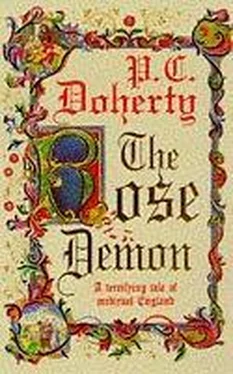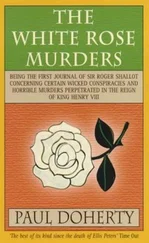Paul Doherty - The Rose Demon
Здесь есть возможность читать онлайн «Paul Doherty - The Rose Demon» весь текст электронной книги совершенно бесплатно (целиком полную версию без сокращений). В некоторых случаях можно слушать аудио, скачать через торрент в формате fb2 и присутствует краткое содержание. Жанр: Исторический детектив, на английском языке. Описание произведения, (предисловие) а так же отзывы посетителей доступны на портале библиотеки ЛибКат.
- Название:The Rose Demon
- Автор:
- Жанр:
- Год:неизвестен
- ISBN:нет данных
- Рейтинг книги:5 / 5. Голосов: 1
-
Избранное:Добавить в избранное
- Отзывы:
-
Ваша оценка:
- 100
- 1
- 2
- 3
- 4
- 5
The Rose Demon: краткое содержание, описание и аннотация
Предлагаем к чтению аннотацию, описание, краткое содержание или предисловие (зависит от того, что написал сам автор книги «The Rose Demon»). Если вы не нашли необходимую информацию о книге — напишите в комментариях, мы постараемся отыскать её.
The Rose Demon — читать онлайн бесплатно полную книгу (весь текст) целиком
Ниже представлен текст книги, разбитый по страницам. Система сохранения места последней прочитанной страницы, позволяет с удобством читать онлайн бесплатно книгу «The Rose Demon», без необходимости каждый раз заново искать на чём Вы остановились. Поставьте закладку, и сможете в любой момент перейти на страницу, на которой закончили чтение.
Интервал:
Закладка:
Christina had laughed at this and asked why he didn’t keep it in the house. Parson Osbert had shaken his head. He claimed such sacred objects should always be kept in a holy place. Matthias got to his feet and walked slowly round the sanctuary. He examined the small lavarium built in the wall where his father used to wash his fingers during Mass before he touched the sacred species. There was nothing. Matthias scrutinised the bricks in the wall, searching vainly for one that might be loose. He knelt down and closed his eyes.
‘Please,’ he prayed. ‘Some sign!’
Daylight was fading. The church was growing darker and he grew more desperate in his searches. On hands and knees, Matthias crawled across the paving stones but these held firm and secure. He recalled his father saying there was no crypt beneath the church. Matthias’ hands and knees became sore from crawling, his eyes hurt. He returned to the fire and bit into the cheese he had bought from the old manor steward, yet he’d lost his appetite and he wondered if his search were a wasteful, dangerous task. He stared down the church, trying to ignore the pools still glistening on the floor. Where else would his father hide anything? Taking a firebrand to light his way, he went down the nave, through a narrow door into the small bell tower. The steps were wet and mildewed; somewhere above there must be a crack in the walls or tiles through which the rain and snow had poured in over the years.
Matthias climbed, moving carefully until he reached the small gallery where his father had stood to summon the parishioners to Mass. The bell rope had long rotted away. Matthias lifted the firebrand and stared at the wooden pegs around which the rope had once been wrapped. These were driven into a wedge of wood fixed into the wall. Matthias pulled and tugged at these; they held firm.
He gave up in disgust and was about to go down the steps when he noticed a small grille built into the base of the wall. Matthias crouched down. He used his dagger and hacked away. The grille came loose. Moving the dying firebrand to give him light, Matthias pushed his hand into the aperture and dug around. From the outside it looked like a simple drain hole but the cavity within was much larger. Matthias sighed as his fingers touched something hard. He drew out the silver pyx, now covered in dirt, then two small phials where the chrism and oil had been kept. He searched again. His hand brushed something hard. He pulled this out. In the poor light he could see the leather bag was engrained with dirt, the cord round the neck frayed. When he cut them loose, his father’s Book of Hours slipped into his hand. Leaving everything except his dagger, Matthias grasped the book and ran down the steps, back into the nave. He built the fire up and, in its warm glow, started to turn over the pages.
The book was made up of stiff pages of parchment stitched together and held between two pieces of very thin wood covered with leather. The book contained psalms and readings from the scriptures. On some pages the carefully curved letters had faded, the small jewel-like miniature paintings grown indistinct. In many of the margins Parson Osbert had written his own commentary in a tidy cursive hand; at the back, the blank folio pages had been covered with jottings and notes. Matthias read through these, trying to ignore the memories they evoked, the homilies his father had planned on the special saints’ days of the parish. He found what he was searching for at the very back. It carried the date, the Feast of the Holy Cross, September 1471. At first Matthias thought his father had simply copied out the ‘Confiteor’, the ‘I Confess’ which every priest recited before Mass. The writing was hasty, the letters ill-formed. Matthias kept moving the book, trying to make out each word.
I, Parson Fitzosbert, confess to Almighty God, the Blessed Virgin Mary, to all the angels and saints and to you my brothers and sisters that I have sinned exceedingly, in thought, word and deed. I have sinned against my God and my Church by becoming handfast to a woman. I have broken my vow of celibacy and chastity. God, in turn, has punished me most grievously. Christina, my wife, is dead. The boy she bore is no flesh of mine. Christina has sinned and confessed as much. She lay with the man in whose death I had a hand: the hermit of Tenebral. Yet, he deserved to die, not only for his terrible sins and what he was, but what he did in making her betray me.
The writing then faltered. Matthias closed the book. He gripped it firmly between his hands. He couldn’t think about anything except his father yelling at him, cursing him, rejecting him. Christina’s strange behaviour, the way she fell ill the day the hermit was tried and executed. Matthias couldn’t stop shivering. He heard sounds outside, horsemen were approaching. All he could do was sit by the fire, his arms wrapped across his chest.
‘Fitzosbert! Matthias Fitzosbert!’
He didn’t move.
Again, ‘Matthias! Matthias Fitzosbert!’ The voice was harsh.
Matthias glanced up at a window. Darkness had fallen. The riders outside were approaching the church. A horse neighed, followed by screams and the sound of swords being drawn. Someone was hammering at the main door but Matthias ignored it. Again, screams, horses rearing and neighing in terror, then silence. Matthias didn’t move. He didn’t care. When those grey shapes he had glimpsed in the cemetery thronged at the back of the church and moved like clouds towards him, he glared back in defiance. The fire began to die. The church was intensely cold. He could not make out the shapes, corpses in their shrouds. The lost, earthbound souls of the dead villagers, faces grey as the shrouds they wore, eyes dead, came and went like puffs of smoke. Matthias felt no fear. Why should he? His father had hinted at the reason for Christina’s collapse and his own soul-breaking rage. Christina had been seduced by the hermit: both she and Osbert believed Matthias was the child of this adulterous liaison.
‘What am I?’ Matthias called into the darkness. ‘Man or demon?’
Was that why he had the second sight? Why he brought chaos and terror to everyone in his life? His parents had died because of him. This village had been devastated because of him. Santerre, Amasia, that long line of dead. Outside a chanting had begun as ghostly choristers assembled in the darkness. Matthias heard the words of the Dies Irae: ‘Day of wrath, oh day of mourning, see fulfilled the heavens’ warning. Heaven and earth in ashes burning.’ Knocking then began on the walls and doors: ghostly voices calling his name. Matthias kept drinking the wine. Verses from Psalm 91 kept running through his tired brain:
You will not fear the terror of the night.
Nor the arrow that flies by day.
Nor the Plague that prowls in the darkness.
Nor the scourge that lays waste at noon.
Matthias staggered drunkenly to his feet.
‘I don’t fear them!’ he shouted. ‘Because I am them! I am the terror of the night! I am the arrow that flies by day! The Plague which prowls in the darkness and the noonday scourge!’
His words echoed round the church. Outside silence fell. The chanting stopped. The knocking on the doors and the pattering along the walls ceased. In the dying light of the fire, Matthias noticed the pools of blood drying up.
‘I can do no more,’ he muttered.
And, lying down on the floor, he curled up like a child and fell into a drunken sleep.
He woke stiff and cold the following morning. His limbs ached, he had a terrible pain in his head and his mouth was dry. He staggered to the window and peered out. The mist had lifted. The grass sparkled under a weak November sun. Matthias went down and opened the door. A corpse sprawled there: the side of the man’s head had been dashed against the iron studs of the door. Matthias felt his neck, there was no blood pulse. He turned the body over: sightless eyes, a horrible wound in the side of the head, the blood congealing on the door and steps.
Читать дальшеИнтервал:
Закладка:
Похожие книги на «The Rose Demon»
Представляем Вашему вниманию похожие книги на «The Rose Demon» списком для выбора. Мы отобрали схожую по названию и смыслу литературу в надежде предоставить читателям больше вариантов отыскать новые, интересные, ещё непрочитанные произведения.
Обсуждение, отзывы о книге «The Rose Demon» и просто собственные мнения читателей. Оставьте ваши комментарии, напишите, что Вы думаете о произведении, его смысле или главных героях. Укажите что конкретно понравилось, а что нет, и почему Вы так считаете.












